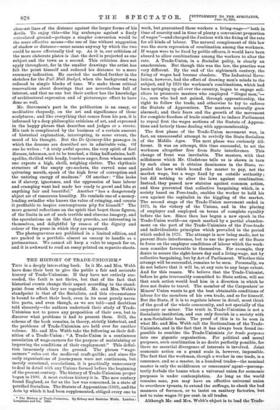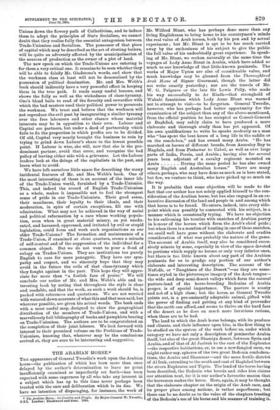THE HISTORY OF TRADE-UNIONISM.*
Tars is a deeply interesting book. In it Mr. and Mrs. Webb have done their best to give the public a fair and accurate history of Trade-Unionism. If they have not entirely suc- ceeded, the fault is not theirs, but that of the fact that historical events change their aspect according to the stand- point from which they are regarded. Mr. and Mrs. Webb's standpoint is that of the Socialists, and this circumstance is bound to affect their book, even in its most purely narra- tive parts, and even though, as we are told—and doubtless told sincerely—the authors undertook their study of Trade- Unionism not to prove any proposition of their own, but to discover what problems it had to present them. Still, the scheme of the book remains, in theory, strictly historical, and the problems of Trade-Unionism are held over for another volume. Mr. and Mrs. Webb take the following as their defi- nition of a Trade-Union : " A Trade-Union is a continuous association of wage-earners for the purpose of maintaining or improving the conditions of their employment." This defini- tion immensely clears the ground. The phrase " wage- earners " rules out the mediaeval craft-guilds; and since the early organisations of journeymen were not continuous, but merely occasional, associations, it is practically unnecessary to deal in detail with any Unions formed before the beginning of the present century. The history of Trade-Unionism proper began in 1800. A most curious history it is. The new century found England, as far as the law was concerned, in a state of petrified Socialism. The Statute of Apprentices (1563), and the Acts by which it had been supplemented, obliged every one to • The History of Tradallaionitnn. By Sidney and Beatrice Webb. London Longman and Oo. 1894. work, but guaranteed these workers a living-wage—" both in time of scarcity and in time of plenty a convenient proportion of wages "—and charged the Justices with the fixing of the rate for all kinds of labour. The natural complement of this law was the stern repression of combination among the workmen. If wages were to be fixed by public officers, it would have been absurd to allow combinations among the workers to alter the rate. A Trade-Union, in a Socialist polity, is clearly an anachronism. But though this was the law, the practice was very different. By the end of the eighteenth century, the fixing of wages had become obsolete. The Industrial Revo- lution, however, had the effect of drawing men's minds to the subject, and by 1810 the workmen's combinations, which had been springing up all over the country, began to engage soli- citors to prosecute masters who employed "illegal men,"- i.e., men who had not gained, through apprenticeship, the right to follow the trade, and otherwise to try to enforce the Statute of Apprentices. The masters naturally grew alarmed; and their fears and the growth of the movement for complete freedom of trade combined to induce Parliament to repeal first the wages sections of the Statute of Appren- tices and latterly those dealing with apprenenticeship.
The first phase of the Trade-Union movement was, in fact, an unsuccessful attempt to revivify the State Socialism of the Middle Ages. The next phase was curiously dif- ferent. It was an attempt, this time successful, to set the workman altogether free from State interference. This change of front was inevitable. The masters, with that selfishness which Mr. Gladstone tells us is shown in turn by each class as it obtains dominance in the State, re- pealed the laws which bound the master to pay, not the market wage, but a wage fixed by an outside authority ; but did nothing to alter the laws against combination. Instead, they passed new statutes against common action, and thus prevented that collective bargaining which, in a society based on Free-trade, enables the worker to hold his own against the capitalist in the higgling of the market. The second stage of the Trade-Union movement ended in 1875, in the victory of the Unions, and in the placing of employer and employed on terms of complete equality before the law. Since then has begun a new epoch in the Trade-Union world—an epoch marked by a partial abandon. ment on the part of the Trade-Unionists of the Free-trade and individualistic principles which prevailed in the period which ended in 1875. The attempt is now being made, not to prevent State interference, but to use the power of the State to force on the employer conditions of labour which the work- men consider favourable to themselves. For example, they desire to secure the eight-hours day and a living-wage, not by collective bargaining, but by Act of Parliament. Whether this attempt will be successful, remains to be seen. Personally, we do not believe that it will be, at any rate to any large extent. And for this reason. We believe that the Trade-Unionist, before he gets irrevocably committed to State action, will see that such action would lead him in a direction in which he does not desire to travel. The member of the Carpenters' or Miners' Union wants to get the best obtainable conditions of labour for the members of his own trade, and so for himself. But the State, if it is to regulate labour in detail, must think of the good of the whole community, and not specially of the carpenter or miner. The truth is, Trade-Unionism is not a Socialistic institution, and can only flourish in a society with a non-Socialistic basis. The proof of this is to be seen in what Mr. and Mrs. Webb call the Sectionalism of the Trade- Unionists, and in the fact that it has always been found im- possible to combine the Trade-Unionists for trade purposes into one gigantic organisation. For political and moral purposes, such combination is no doubt perfectly possible, for there no essential divergence of interests is involved. Joint economic action on a grand scale is, however, impossible. The fact that the workman, though a worker in one trade, is a consumer, and so a master, in a hundred trades—the nominal master is only the middleman or consumers' agent—peremp- torily forbids the banns when a universal union for economic purposes is under contemplation. As long as the world remains sane, you may have an effective universal union to overthrow tyrants, to extend the suffrage, to check the bad manners of foremen, or to insist on sanitary factories, but not to raise wages 50 per cent. in all trades.
Although Mr. and Mrs. Webb's object is to lead the Trade- Unions down the flowery path of Collectivism, and to induce them to adopt the principles of State Socialism, we cannot doubt that they realise fully the essential antagonism between Trade-Unionism and Socialism. The possessor of that piece of capital which may be described as the art of riveting boilers, will be quite as adversely affected by the municipalisation of the sources of production as the owner of a plot of land.
The new epoch on which the Trade-Unions are entering is for them a very critical one. It remains to be seen whether they will be able to falsify Mr. Gladstone's words, and show that the workman class at least will not be demoralised by the possession of political domination. Mr. and Mrs. Webb's book should indirectly have a very powerful effect in keeping them in the true path. It reads many useful lessons, and shows the folly as well as the wickedness of class-tyranny. One's blood boils to read of the ferocity and cowardice with which the bad masters used their political power to persecute the workmen. We trust and believe that the workmen will not reproduce the evil past by inaugurating a similar tyranny over the free labourers and other classes whose material interests may be in opposition to their own. Labour and Capital are partners, but under a deed of partnership which fails to fix the proportion in which profits are to be divided. Of old, Capital very nearly brought the business to rain by trying to grind down Labour's share to the lowest possible point. If Labour is wise, she will, now that she is the pre- dominant partner, avoid that error, and recognise the bad policy of leaving either side with a grievance. Let the Labour leaders look at the doings of the capitalists in the past, and learn what to avoid.
We have left ourselves little space for describing the many incidental features of Mr. and Mrs. Webb's book. One of the most interesting of these is an account of the inner life of the Trade-Union world, furnished by a Trade-Unionist. This, and indeed the record of English Trade-Unionism as a whole, makes it impossible not to feel the strongest sense of pride in our Trade-Unionists. Their good sense, their manliness, their loyalty to their ideals, and their moderation, in spite of certain exceptions, fill one with admiration. What may not be achieved in the way of social and political reformation by a race whose working popula- tion, even when in great material misery, as yet unedu- cated, and harassed, oppressed, and irritated by evil or stupid legislation, could form and work such organisations as our older Trade-Unions The formation and maintenance of a Trade-Union, if examined at close quarters, seems a miracle of self-control and of the suppression of the individual for a common object. But we do not want to pour a flood of eulogy on Trades-Unions. They are institutions too purely English to care for mere panegyric. They have our sym- pathy and respect, and we sincerely hope that they may avoid in. the future the evils of that class-tyranny which they fought against in the past. This hope they will appre- ciate far more than "a foolish face of praise." We will conclude our notice of Mr. and Mrs. Webb's able and in- teresting book by noting that throughout the style is clear and readable, and that the work, as such a work should be, is packed with references and quotations. We are not worried with watered-down accounts of what this and that man said, but wherever possible, are given his actual words. The book ends with a most useful map, designed to show the geographical distribution of the members of Trade-Unions, and with a marvellously full bibliography of books and pamphlets bearing on Trade-Unionism. The authors are to be congratulated on the completion of their joint labours. We look forward with interest to their promised volume on the Problems of Trade- Unionism, knowing that, whatever may be the conclusions arrived at, they are sure to be interesting and suggestive.



















































 Previous page
Previous page